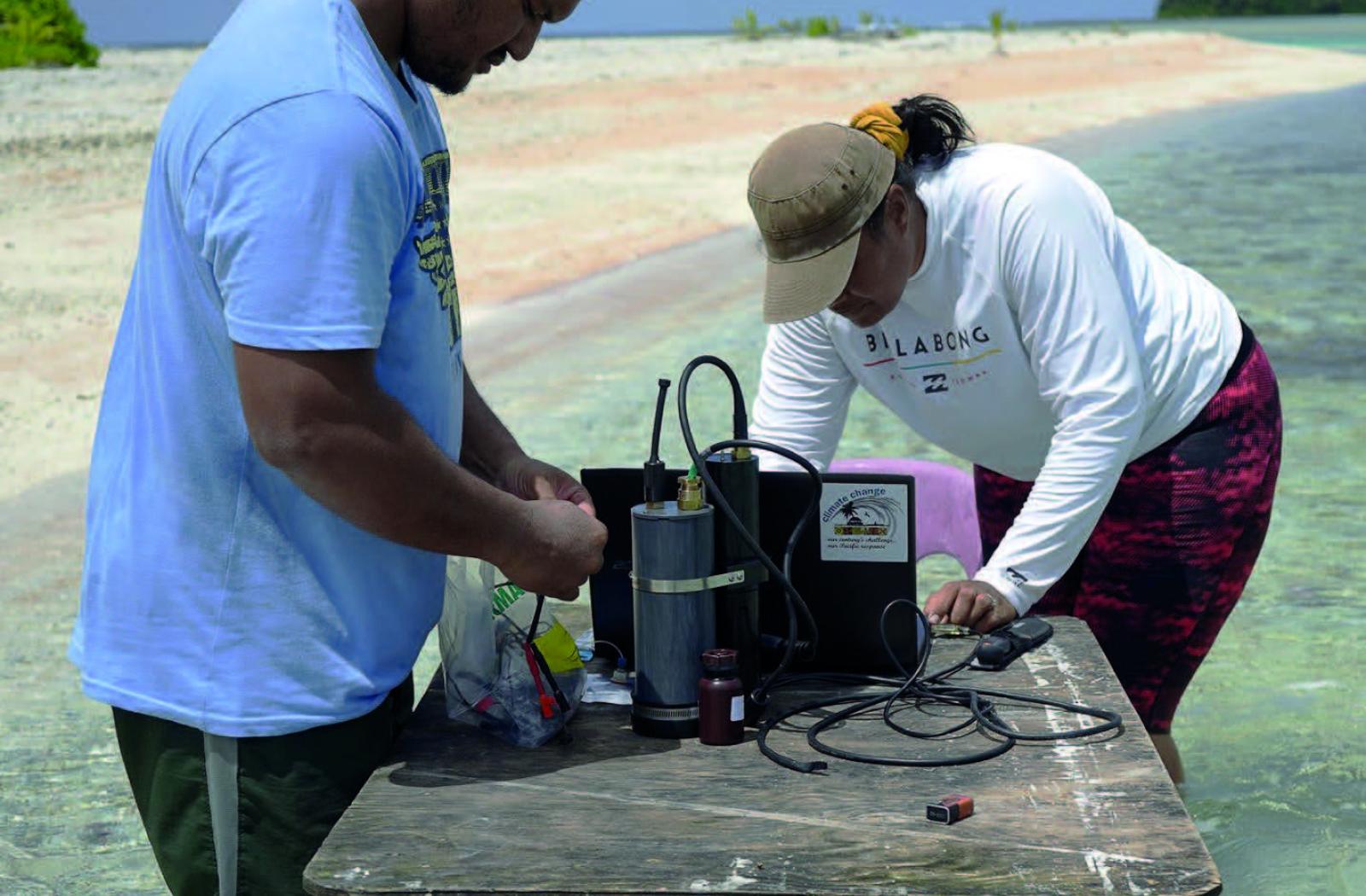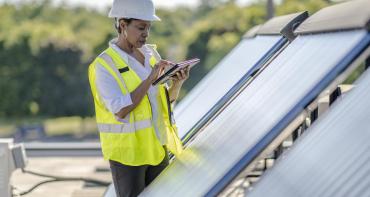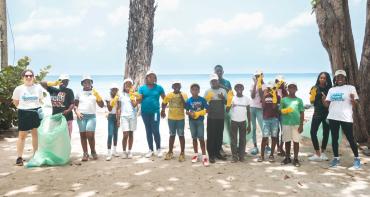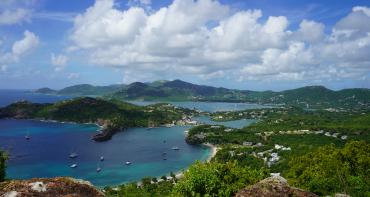The Pacific Partnership on Ocean Acidification (PPOA) is a four-year collaborative project between the Secretariat of the Pacific Regional Environment Programme SPREP, the University of the South Pacific (USP) and the Pacific Community (SPC) with the goal of building resilience to ocean acidification in the Pacific Islands.

Share your own case study with us
“The Pacific Partnership on Ocean Acidification (PPOA) is empowering Pacific Island communities to face the challenges posed by ocean acidification. PPOA works directly with stakeholders at all levels, from school children to women’s groups, village leaders and policy-makers. By building Pacific capacity to confront ocean acidification, PPOA supports Pacific communities to monitor their own coastal ocean chemistry, develop national policies to address ocean acidification and apply Pacific traditional ecological knowledge to adapt their coastal ecosystems to become more resilient to the threat of ocean acidification.”
Dr Duncan McIntosh, PPOA Project Manager at the Secretariat of the Pacific Regional Environment Programme
The project’s pilot sites are in Fiji, Kiribati and Tokelau and activities focus on research and monitoring, capacity-building and awareness-raising, policy support and implementing practical adaptation actions. Financial support is provided by the New Zealand Ministry of Foreign Affairs and Trade and the Principality of Monaco.
The issue
Small island developing states (SIDS), such as nations in the Pacific Island region, are highly exposed to the impacts of climate change and ocean acidification, given their close proximity to the marine environment and their reliance on marine resources for livelihoods and infrastructure.
In particular, the Pacific Islands are especially vulnerable to the effects of ocean acidification. For example, as the ocean acidifies it becomes more difficult for coral reefs to calcify, resulting in net dissolution. As the coral structure erodes, the reef becomes a less effective force against wave and storm erosion, and it is harder to keep up with sea level rise.
In addition, the tourism infrastructure and fisheries industries in the Pacific Islands rely heavily on healthy coral reefs. Therefore, the impacts of ocean acidification in the region strongly affect community resilience and economic well-being.
The response
The Pacific Partnership on Ocean Acidification (PPOA) was created to address needs identified during the Third UN SIDS Conference in Apia, Samoa, in 2014 following the International Workshop on Ocean Acidification: State-of-the-Science Considerations for SIDS, cohosted by New Zealand and the USA.
The project identified three main areas of focus: Research and Monitoring; Capacity-Building and Awareness-Raising; and Practical Adaptation Actions. The Research and Monitoring component focuses on establishing ecological baselines, supporting ocean acidification monitoring and conducting vulnerability assessments. The Capacity-Building and Awareness-Raising component builds the capacity of local communities to understand, monitor and adapt to ocean acidification and raise awareness through media production and distribution in order to develop effective coastal zone management.
Lastly, the Practical Adaptation Actions component includes working with communities to identify and implement stakeholder priorities for adaptation actions to enhance ecosystem resilience to ocean acidification. Adaptation actions include mangrove and seagrass restoration, coral restoration, locally managed marine areas and alternative livelihood opportunities.
Partnerships and support
Project partners include SPREP, USP, SPC and Pacific Island countries and territories. Funding partners are the Government of New Zealand (the New Zealand Ministry of Foreign Affairs and Trade) and the Principality of Monaco. The Ocean Foundation provided ocean acidification monitoring equipment and training, which SPREP is utilising as part of the PPOA project.
The PPOA project will be completed in December 2020.
Results, accomplishments and outcomes
In 2015, the PPOA hosted a regional workshop on ocean acidification in Auckland, New Zealand. In the pilot project sites of Fiji, Kiribati and Tokelau, baseline assessments of marine ecosystems and coral and seagrass replanting projects have been conducted. The Government of Tokelau’s Ministry of Climate, Ocean and Resilience (MiCORE) has developed an ocean acidification monitoring programme with equipment and training provided by The Ocean Foundation and on-going guidance from SPREP.
As a result of the PPOA project, two vulnerability assessments have been published: the Pacific Islands Ocean Acidification Vulnerability Assessment and the Ocean Acidification Vulnerability Assessment of Pelagic Fisheries. In addition, ocean acidification information media have published and distributed to local island communities via outreach programming and local language factsheets.
The PPOA project has fostered partnerships with the University of Newcastle, Australia to provide a full scholarship and stipend to a Pacific PhD student who is now researching OA at PPOA’s pilot sites and Kiribati Ministry of Fisheries to establish an LMMA at Nanikai, Tarawa that encompasses mangrove, seagrass, and coral restoration. Five LMMAs have also been established in Taveuni, Fiji that include giant clam restocking, and coral and mangrove restoration.
Challenges
A primary challenge has been the logistics of working in remote islands, as moving people and equipment can be both expensive and slow. Occasionally, the only way to deal with this matter is to allow for additional time and accept delays. Another main challenge is that the Pacific Islands face limited human capital. For example, trained and skilled environmental professionals often wear many hats and have limited time (MiCORE currently has two staff). High turnover rates are problematic for capacity-building efforts in the region, as it is common for local talent to be called up to another position or move abroad to pursue higher education opportunities.
Key lessons learnt
As the PPOA project is still underway, more lessons will be learnt on its completion in December 2021. Thus far, the PPOA has learned that Pacific island communities are very eager to learn about and understand ocean acidification. According to the PPOA Project Manager, “Stakeholders at our adaptation pilot sites in Kiribati, Fiji and Tokelau, ranging from fishermen to children, women’s groups and high chiefs, have proved ready to engage on the subject of ocean acidification in their own languages. In the Pacific, people are well aware of the importance of coral reefs, and once they learn about how ocean acidification threatens their reefs, they are keen to take action.”
Lastly, by taking a stakeholder-driven approach, the communities involved in the PPOA aredeveloping strong ownership of the adaptation work, which will continue beyond the project’s completion.
Photo credit: Jana Steingaesser, Ministry of Climate, Oceans & Resilience (MiCORE)
Download this case study (PDF)
View all case studies
Media contact
- Josephine Latu-Sanft Senior Communications Officer, Communications Division, Commonwealth Secretariat
- +44 20 7747 6476 | E-mail



